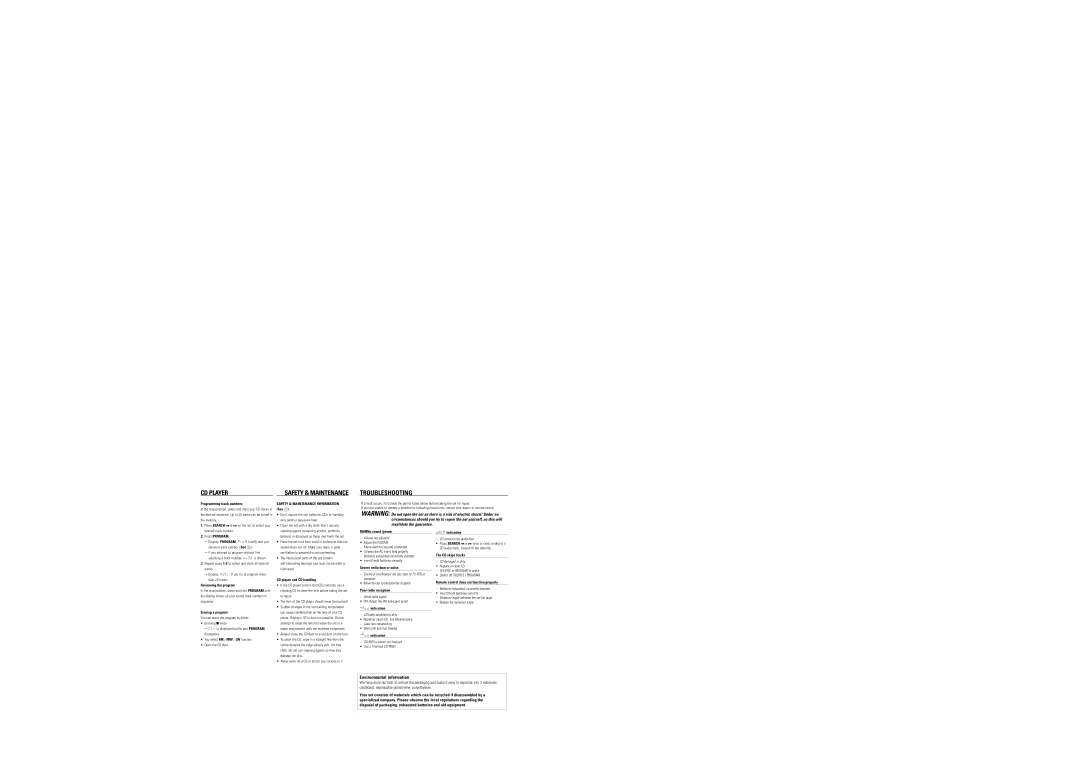
CD PLAYER | SAFETY & MAINTENANCE |
TROUBLESHOOTING
Programming track numbers
In the stop position, select and store your CD tracks in the desired sequence. Up to 20 tracks can be stored in the memory.
1. Press SEARCH ∞ or § on the set to select your |
SAFETY & MAINTENANCE INFORMATION
(See 7)
• | Don't expose the set, batteries, CDs to humidity, |
| rain, sand or excessive heat. |
• | Clean the set with a dry cloth. Don't use any |
If a fault occurs, first check the points listed below before taking the set for repair.
If you are unable to remedy a problem by following these hints, consult your dealer or service centre.
WARNING: Do not open the set as there is a risk of electric shock! Under no circumstances should you try to repair the set yourself, as this will invalidate the guarantee.
desired track number. |
2. Press PROGRAM. |
™ Display: PROGRAM, Prog briefly and your |
selected track number. (See 5) |
™ If you attempt to program without first |
selecting a track number, noSE is shown. |
3. Repeat steps |
tracks. |
™ Display: FULL if you try to program more |
than 20 tracks. |
Reviewing the program
In the stop position, press and hold PROGRAM until the display shows all your stored track numbers in sequence.
Erasing a program
You can erase the program by either:
•pressing 9 twice
™ CLr is displayed briefly and PROGRAM
disappears.
•You select FM / MW / LW function.
•Open the CD door.
| cleaning agents containing alcohol, ammonia, |
| benzene or abrasives as these may harm the set. |
• | Place the set on a hard and flat surface so that the |
| system does not tilt. Make sure there is good |
| ventilation to prevent the set overheating. |
• | The mechanical parts of the set contain |
| |
| lubricated. |
CD player and CD handling
•If the CD player cannot read CDs correctly, use a cleaning CD to clean the lens before taking the set to repair.
•The lens of the CD player should never be touched!
•Sudden changes in the surrounding temperature can cause condensation on the lens of your CD player. Playing a CD is then not possible. Do not attempt to clean the lens but leave the set in a warm environment until the moisture evaporates.
•Always close the CD door to avoid dust on the lens.
•To clean the CD, wipe in a straight line from the centre towards the edge using a soft,
•Never write on a CD or attach any stickers to it.
RAMNo sound /power
–Volume not adjusted
• Adjust the VOLUME
–Mains lead not securely connected
• Connect the AC mains lead properly
–Batteries exhausted/ incorrectly inserted
• Insert (fresh) batteries correctly
Severe radio hum or noise
–Electrical interference: set too close to TV, VCR or computer
• Move the set to increase the distance
Poor radio reception
–Weak radio signal
• FM: Adjust the FM telescopic aerial
nocd indication
–CD badly scratched or dirty
•Replace/ clean CD, see Maintenance
– Laser lens steamed up
•Wait until lens has cleared
nFcd indication
–
• Use a finalized
dAtA indication
–CD contains
•Press SEARCH ∞ or § once or more to skip to a CD audio track, instead of the data file
The CD skips tracks
–CD damaged or dirty
• Replace or clean CD
–SHUFFLE or PROGRAM is active
• Switch off SHUFFLE / PROGRAM
Remote control does not function properly
–Batteries exhausted/ incorrectly inserted
• Insert (fresh) batteries correctly
–Distance/ angle between the set too large
• Reduce the distance/ angle
Environmental information
We have done our best to reduce the packaging and make it easy to separate into 3 materials: cardboard, expandable polystyrene, polyethylene.
Your set consists of materials which can be recycled if disassembled by a specialized company. Please observe the local regulations regarding the disposal of packaging, exhausted batteries and old equipment.
